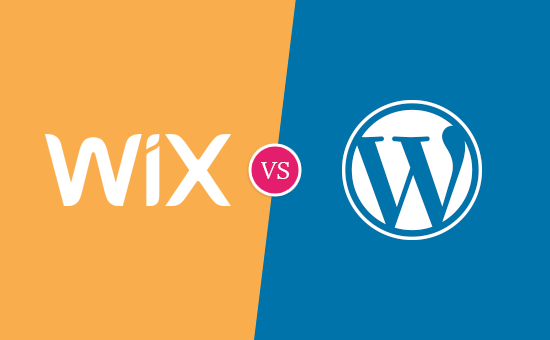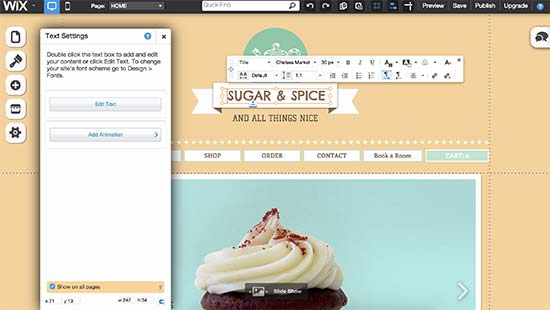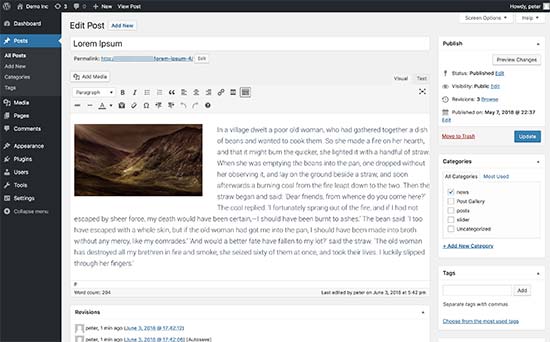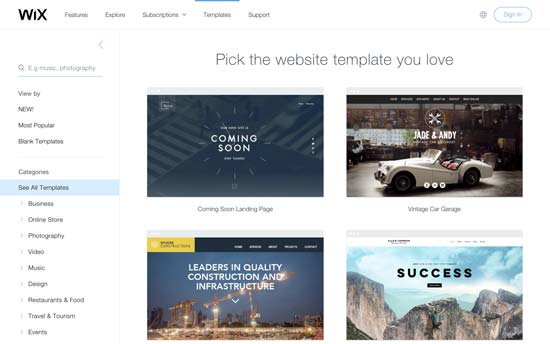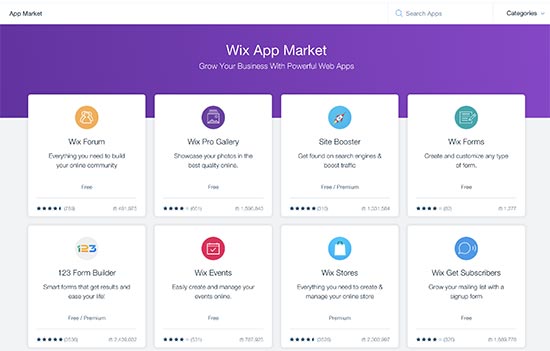Are you looking for a Squarespace vs WordPress comparison to figure out which one is better?
Squarespace and WordPress are two popular website builders that allow you to easily make a website without coding.
In this article, we will compare Squarespace vs. WordPress with the list of pros and cons for each platform. Hopefully, it will help you decide which one is better for your needs.
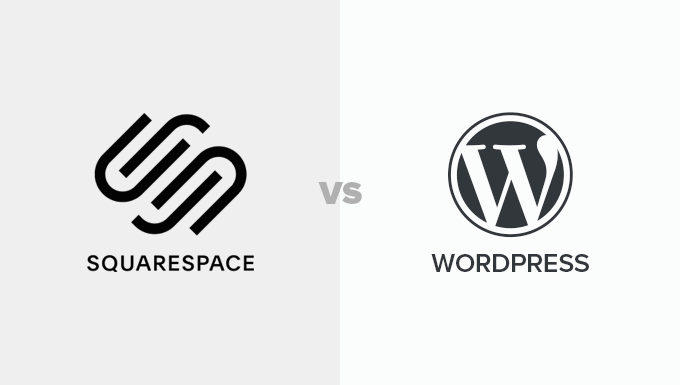
Note: This comparison is between Squarespace vs self-hosted WordPress (not WordPress.com). See the difference between self-hosted WordPress vs WordPress.com.
Since we want to create the most detailed WordPress vs Squarespace comparison, we have broken down the article into multiple in-depth sections.
We will look at each section and see which platform offers the most benefit to a beginner-level user.
- Ease of Use and The Learning Curve
- Costs of Using Squarespace vs WordPress
- Design and Templates
- Extensions and Integrations
- E-commerce Comparison – Squarespace vs WordPress
- Data Portability
- Languages and Internationalization
- Summarizing Squarespace vs WordPress Comparison
- Frequently Asked Questions about Squarespace vs WordPress
Ready? Let’s get started.
Ease of Use and The Learning Curve
Most business owners and beginner-level users are not familiar with HTML, CSS, and other code-related things.
They want a website builder that is beginner friendly and helps them make a website without hiring a developer.
Let’s see how both WordPress and Squarespace stack up in this category.
WordPress
WordPress is the top choice among users who want to start a blog or small business owners building a DIY website.
WordPress is the best website builder on the market. More than 43% of all websites on the internet use WordPress
While WordPress is fairly intuitive and easy to use, there is a slight learning curve.
Beginners will need to familiarize themselves with WordPress terminology and concepts such as the difference between posts vs pages, categories vs tags, and understanding themes and plugins.
The default WordPress content editor is fairly easy to use.
It comes with blocks to add common content elements to your pages so that you can build beautiful layouts with media-rich content.
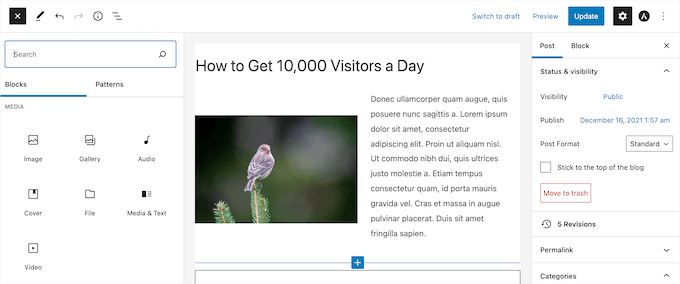
Despite the slight learning curve, in our experience, most users quickly adapt to WordPress.
Need an even more flexible way to create pages?
WordPress gives you access to drag-and-drop page builder plugins like SeedProd. This allows you to create your own custom designs from scratch without writing code.
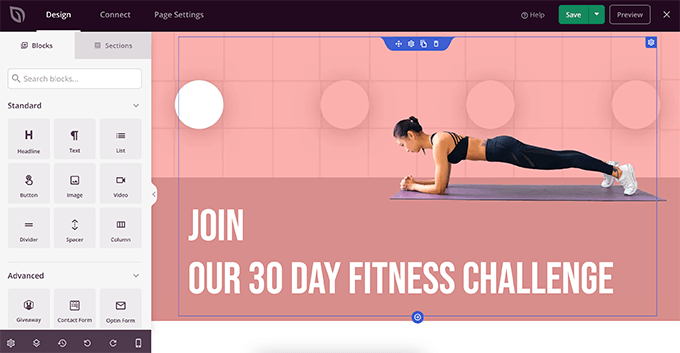
Squarespace
Unlike WordPress, Squarespace does not come with a lot of choices.
This lack of choice makes it very simple and user-friendly. Even absolute beginners can quickly write content and publish it.

Squarespace also uses a block editor similar to WordPress. Adding images, videos, and audio files is simpler than WordPress.
There are plenty of content blocks, and each block has multiple layout control choices.
Squarespace lets you customize your templates and pages using a visual editor.
However, you are limited to the options available in the customizer, since it is a controlled environment.
Conclusion
Squarespace fares a little better than WordPress out of the box in terms of ease of use for absolute beginners. However, its limited features might not be ideal for all business owners.
On the other hand, WordPress users will get a lot of options right from the beginning, which might be confusing at first, but it is a lot more flexible in the long run.
Winner: Tie
Costs of Using Squarespace vs WordPress
Knowing how much each platform cost is important in making a business decision.
Let’s look at how much Squarespace costs vs. how much WordPress costs.
WordPress
WordPress itself is free. You are free to download, use, and build upon WordPress. It is open-source software with a GPL license which gives you all the freedom and control.
In order to build your website with WordPress, you will need to register a domain and signup for a web hosting account.
Depending on your needs, you can choose a shared hosting plan, VPS hosting, or even managed WordPress hosting.
Shared hosting plans work for most personal and small business websites.
See our guide on how to choose the best WordPress hosting.
The cost of web hosting and domain name vary depending on your hosting provider. You are in charge of how many resources you need for your website and how much you will pay for it.
For instance, you can start with Bluehost. They are offering WPBeginner users 60% off and a free domain name with SSL certificate.

If you can spend a little more, you can upgrade to SiteGround.
One of the reasons for WordPress’ popularity is that the overall cost of building your website with WordPress is very low.
Apart from that, you can change your hosting plan as your site grows. This means you will only pay for the resources you use, so it’s easier to control the cost of your website.
We have a detailed article on the cost of building a WordPress website and how to keep it under budget.
Squarespace
The personal plan for Squarespace starts from $16 per month (billed annually) or $23 month to month. That’s a little more than a shared hosting plan for WordPress.
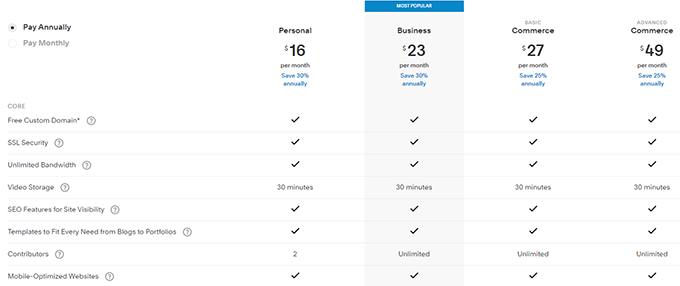
However, unlike a shared WordPress hosting service, this Squarespace plan comes with limited features.
You can only add only two contributors to your site, and you cannot sell products.
Whereas you can start an online store with WordPress for less than that.
Squarespace business plan starts from $23 per month (billed annually) or $33 month to month.
It includes eCommerce support, but they charge a 3% fee on each transaction. This is separate from the fee charged by your payment processor.
The business plan comes with unlimited contributors, pages, and additional advanced features.
They also have separate plans for online stores starting from $27 per month with no additional transaction fee.
Conclusion
As an open-source platform, WordPress beats Squarespace with flexible pricing plans available from a variety of web hosting providers. Squarespace pricing is higher than WordPress and with less flexibility.
The cost depends on how many resources you use, and you get access to all WordPress features right out of the box.
Winner: WordPress
Design and Templates
WordPress and Squarespace come with ready-made templates and design tools to make it easy for you to create a custom website.
Let’s see which offers you more choices and tools to create well-designed websites.
WordPress
WordPress offers access to thousands of free and premium themes (website templates). These templates are highly customizable, allowing you to use your website logo, colors, upload your own images, and more.
Many WordPress themes come with multiple layout choices, a drag-and-drop editor, sliders, photo galleries, and tons of other features.
No matter what kind of web design you need, you will find hundreds of professionally designed templates for the job.

Many beginners find this abundance of choices a bit overwhelming. Here are some of our expert picks of the best WordPress themes for different kinds of websites.
- Best free WordPress blog themes
- Best WordPress themes for business websites
- Best WordPress magazine themes
- Best simple WordPress themes
For more on this topic, see our article on how to choose the best WordPress theme for your website.
Alternatively, you can also start with the SeedProd. It is a drag-and-drop WordPress website builder that allows you to design a custom WordPress theme from scratch without coding.
Squarespace
Squarespace offers ready-made website templates neatly organized into different categories.
There are Squarespace templates for all popular website categories, with professional designs that look good on all devices.
You can easily select a template for your Squarespace website and modify it using the built-in customizer.

However, this is a big area where Squarespace seriously falls behind.
The number of pre-made templates is very limited, and your design options are also limited to the set of features available in the Squarespace customizer.
Themes come with a limited number of layout choices with each template. You can still tweak colors, fonts, website logos, and other things, but these templates are not as customizable as WordPress themes.
Conclusion
WordPress comes out as a clear winner in terms of design choices, customization options, and flexibility. Squarespace offers great-looking templates, but they are limited in numbers and are not very flexible.
Winner: WordPress
Extensions and Integrations
All website builders come with a collection of built-in features. As your website grows, you would want to add more features and connect your site to work with third-party tools and services.
Let’s see how WordPress and Squarespace perform in this regard.
WordPress
The real power of WordPress comes from its massive ecosystem of plugins. These plugins are like apps for your WordPress site that you can install to add new features or change the default behavior of your site.
There are currently more than 60,000+ free WordPress plugins listed in WordPress.org plugin directory alone. There are also thousands of premium WordPress plugins available from third-party websites.
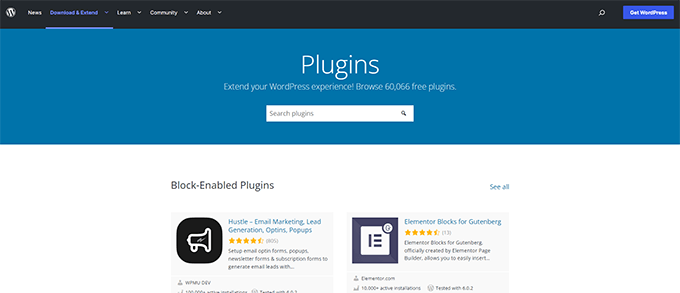
If you can think of a feature, there is a good chance that you’ll easily find a WordPress plugin that does it.
WordPress plugins are so robust that many of them are full-fledged platforms with their own add-on plugins and a thriving community built around them.
We have a list of the essential WordPress plugins that every website should have.
Then you have specialized plugins to create ecommerce websites, build membership communities, sell online courses, and more.
To learn more, see our article on how to choose the best WordPress plugin.
Because WordPress is the most popular website builder, most third-party services and tools have their own WordPress plugins which integrate their services to a WordPress website.
WordPress also has integrations available for all popular social media platforms.
All top email marketing services, SEO tools, live chat software, and lead generation tools offer seamless integration with WordPress.
Squarespace
Squarespace comes nowhere close to WordPress when it comes to extensibility and integrations.
They do offer a very limited set of extensions and integrations. However, unlike WordPress, Squarespace doesn’t have powerful APIs that developers can build upon.

The available integrations are often limited in functionality and you cannot use them as freely on Squarespace as you can do on WordPress.
For eCommerce, you can use their built-in platform, but you cannot extend it in any way.
Squarespace lacks the functionality to allow custom websites you might need for your online business idea.
Conclusion
WordPress is the clear winner with an incredible ecosystem of thousands of plugins and integrations at your fingertips.
Squarespace, on the other hand, has very few integrations and many of them are very limited.
Winner: WordPress
E-commerce Comparison – Squarespace vs WordPress
Are you building an online store? Let’s compare the eCommerce functionality of WordPress vs. Squarespace.
WordPress
WordPress allows you to integrate and use any payment processor or platform.
Many WordPress plugins allow you to easily accept online payments using credit cards via Stripe, PayPal, Google Checkout, 2Checkout, Payoneer, Skrill, and even Bitcoin.
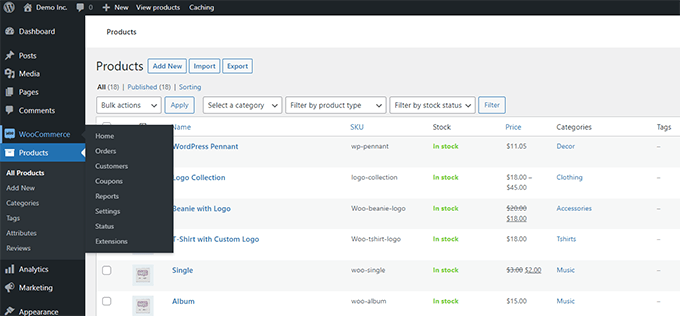
WordPress has plenty of eCommerce plugins that can turn your website into an online store within minutes.
The world’s most popular eCommerce platform, WooCommerce, is a WordPress plugin.
WooCommerce comes with its own ecosystem of WooCommerce add-ons and thousands of WooComemrce ready themes.
There is no limit on how many products you add to your website, how you display them, or how you sell them.
You can run your own affiliate program and use all the tricks to grow your sales without any restrictions.
Squarespace
Ecommerce features are quite limited on Squarespace. You can only use Stripe and PayPal for payment processing, both of which are only available in select countries.
There is no other payment system available, which restricts your ability to accept payments from a larger global audience.
For a growing business, starting with such limitations is not a great idea.
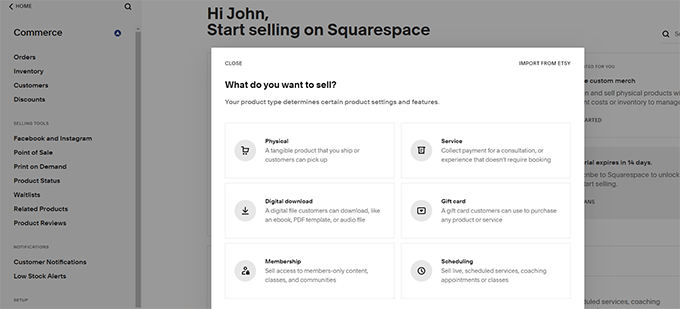
Apart from that, you can only sell products in Business or Commerce plans. Due to transaction fees, Squarespace users need to upgrade to an eCommerce plan to save on that.
Let’s say you want to sell only one product, you will still have to pay for the Business plan, and the yearly costs of hosting a site with just one product to sell will be way higher than a shared hosting plan or VPS for WordPress.
As for third-party services, there are very few external services that you can integrate with your Squarespace site.
This affects how you promote your website and the things you can do to make more sales and grow your business.
Conclusion
WordPress is way ahead of Squarespace when it comes to running an eCommerce website. The limitations of Squarespace can affect the growth of an online business.
The neat part about WordPress is that you can also use it alongside Shopify. See our comparison of Shopify vs WooCommerce.
Winner: WordPress
Data Portability
When signing a business agreement, you always have safety clauses such as, if you’re not happy, then you can leave without any hassle.
This concept extends to online businesses as well, and it is called data portability.
If you’re not happy with the platform, then you should be able to take all your work and move it somewhere else.
Let’s look at how WordPress and Squarespace compare in data portability and the freedom to switch.
WordPress
WordPress comes with built-in tools to easily export all your data.
Not just your content and images, but you can also back up your themes, plugins, and the entire database. See our list of the best WordPress backup solutions.
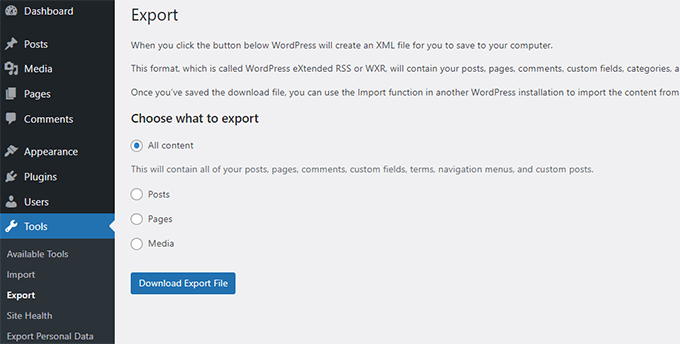
You can then easily move this content to any other Content Management System you want. You can store your content anywhere else and change web hosts at any time you want.
Squarespace
Just like everything else, the export feature on Squarespace is also very limited.
You can only export certain parts of your content in an XML file. This includes your pages, galleries, and one blog page with all its posts.
Your product pages, album pages, text, audio, and video blocks will not be exported.
Conclusion
The content you create on your site is yours, and you should have the freedom and tools so that you can move it elsewhere.
WordPress again beats Squarespace with easy-to-manage tools to export your entire site.
Winner: WordPress
Languages and Internationalization
We live in a global world and many businesses cater to a multilingual audience in different geographical locations.
Let’s see how Squarespace and WordPress handle languages, multi-lingual content, and geographical locations.

WordPress
WordPress is fully translated into dozens of languages. Users on a WordPress site can choose their own language from their profile settings.
Most WordPress themes are translation-ready and all popular WordPress plugins are also translated into many languages.
You can build a WordPress website in any language you want. You can even translate WordPress yourself if your language is not yet available.
WordPress does not come with multi-lingual functionality out of the box. However, there are excellent plugins to create multilingual websites that are SEO-friendly and incredibly feature-rich.
Squarespace
The Squarespace platform is fully translated into six languages (English, German, French, Spanish, Italian, and Portuguese). It also partially supports a few more languages.
You can change your site language and choose a different timezone / country.
You can only use currencies supported by Stripe or PayPal for your store products.
You can create multilingual pages by basically duplicating your pages. You will have to manually create a site structure or different sites for each language (You will be billed for each site separately).
Alternatively, you can pay for Weglot, a third-party service to manage translations. Pricing for Weglot starts at $9.99 per month for one language.
Conclusion
WordPress is way ahead in terms of languages and localization options. Squarespace again comes out as very limited and not suitable for creating multilingual websites.
Winner: WordPress
Summarizing Squarespace vs WordPress Comparison
WordPress is a far superior platform to Squarespace when it comes to building a website. Our CMS market share report shows that WordPress powers over 43% of all websites while Squarespace is only used by 2.1% of websites.
Here is a quick breakdown of pros and cons of both platforms.
Pros of using Squarespace
- Easier to use for small websites
- Polished user experience
- Hassle-free website setup
- Customer support via Twitter, Live Chat, and email support.
Cons of using Squarespace
- Costs higher than a website on shared hosting
- Limited design choices
- Limited set of features
- Limitations put you at disadvantage in growing your business
Pros of using WordPress
- Easy to use with a slight learning curve
- Incredibly flexible to create any kind of website
- Massive collection of themes and plugins
- Truly powerful eCommerce platform
- Can be started at a very low cost
- Community support via online forums
Cons of using WordPress
- You’ll have to install updates and make backups
- You’ll have to manually scale resources by upgrading your hosting as your business grows
- You’ll be responsible for managing your website security
Weighing the pros and cons, we can confidently say that WordPress is a better platform to start a website.
The freedom to grow your website as you see fit is important for all businesses.
You should not trade that for any cost. WordPress provides this freedom at a much lower cost than all other platforms.
Frequently Asked Questions about Squarespace vs WordPress
Following are some of the most commonly asked questions about Squarespace vs WordPress.
1. Is WordPress better than Squarespace?
Yes, WordPress is better than Squarespace because it gives you more freedom and flexibility to build any kind of website.
Squarespace is easy to use but it offers a free limited set of features and flexibility. It is comparable to platforms like Wix or Weebly which are also fully hosted site builders with similar limitations.
2. Is WordPress better for SEO than Squarespace?
Yes, WordPress is better for SEO (Search Engine Optimization) than Squarespace. With WordPress you can use SEO plugins like All in One SEO for WordPress, which allows you to add powerful sitemaps, schema markup, meta title and descriptions, and more.
With Squarespace, you are limited to the SEO functionality baked into the platform and cannot extend it.
3. How can I move my site from Squarespace to WordPress?
Squarespace offers limited export options but you can still switch from Squarespace to WordPress. See our tutorial on how to easily move from Squarespace to WordPress for step-by-step instructions.
4. Squarespace vs WordPress which one is better for bloggers?
WordPress is the better platform for bloggers. It started out as a blogging platform and still has the best blogging tools than any other site builder on the market.
We hope this article offered you a side-by-side comparison of WordPress vs Squarespace. You may also want to see our complete WordPress review for a detailed overview of the platform.
If you liked this article, then please subscribe to our YouTube Channel for WordPress video tutorials. You can also find us on Twitter and Facebook.
The post Squarespace vs WordPress – Which Is Better? (Pros and Cons) first appeared on WPBeginner.
